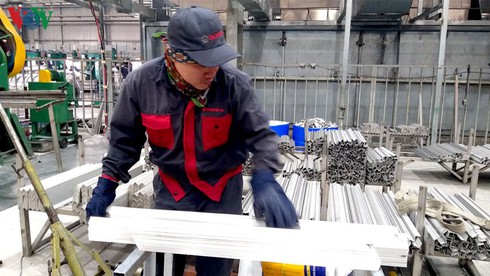 |
|
Local enterprises keen to remove hurdles amid COVID-19 epidemic
|
The novel coronavirus (COVID-19) epidemic has so far had a significant impact on almost every economic sector, forcing many businesses to disrupt production. Several industrial businesses fear a scarcity of raw materials will cause both production and business activities to be suspended.
Businesses in hot water
Tran Duc Ha, owner of a plastic-manufacturing enterprise in northern Vinh Phuc province, saý since the COVID-19 broke out, his enterprise has cut its production by half, as customers have cancelled all contracts signed for the first two quarters of the year.
"We must still pay workers to ensure their livelihoods though there are no contracts," Ha explains. "In fact, we are likely to go bankrupt if the epidemic shows no signs of waning."
Along with this, the nation’s steel industry is also facing a range of hurdles with several markets moving to impose stricter controls on the flow of goods and people in the export process. In addition, several construction projects that use steel have stagnated, leading to a reduction in demand for steel in comparison with the same period last year.
Trinh Khoi Nguyen, Vice Chairman of the Vietnam Steel Association, points out the fact that the COVID-19 epidemic has affected the domestic steel industry in terms of both production and consumption.
"The epidemic has led to disruption for the entire global supply chain, leading to a shortage of raw material sources when it comes to steel industry production, especially in markets such as China, the Republic of Korea, and Japan."
According to data released by the Department of Industry under the Ministry of Industry and Trade (MoIT), as a result of the impact of the COVID-19 epidemic, the majority of textile and footwear firms have only stockpiled enough raw materials to last until early March or early April. This has led to several businesses being forced to halt production due to a shortage of raw materials in the near future.
Nguyen Huu Thanh, Director of Eurolink Joint Stock Company, an enterprise which specialises in providing high-class garments and leather products, says the shortage of raw materials has led to production and business activities becoming stagnant in the first quarter.
"We have modified our production and business targets, with a primary focus on seeking new material supply sources from, for examples, India and Europe."
Specific support policies in dire need
In light of these challenging times, several companies and craft associations have recently made recommendations to relevant ministries and the government to ensure that sources of raw input materials and accessories are maintained for domestic industrial enterprises.
The Vietnam Steel Association, along with enterprises in the sector, has proposed that the government provide specific support solutions in terms of finance, credit, interest rate reduction, and debt rescheduling, whilst also devising plans in terms of customs clearance for goods that can serve to meet the production needs of enterprises.
Truong Van Cam, Vice President and General Secretary of Vietnam Textile and Apparel Association, points to the fact that the textile and footwear industry is heavily reliant on material imports from China, which has consequently affected the supply source of raw materials following the COVID-19 outbreak.
"In response to any potential worst case scenarios, a number of textile and footwear enterprises are seeking alternative sources of materials from other countries such as the Republic of Korea, India, Bangladesh, and Brazil in a bid to make up for the shortage of raw materials in production," Cam says.
Truong Thanh Hoai, Director of the Industry Department under the MoIT, says that in order to remove difficulties for domestic firms, the department will continue to devise solutions aimed at supporting enterprises as they seek alternative sources of materials and strengthen trade promotion activities.
These actions will help to expand export markets and avoid a reliance on the Chinese market whilst taking advantage of newly signed free trade agreements such as the Comprehensive and Progressive Agreement for Trans-Pacific Partnership (CPTPP) and the EU-Vietnam Free Trade Agreement (EVFTA).
Recently, Minister of Industry and Trade Tran Tuan Anh issued Directive No. 06, with measures aimed at preventing and controlling the epidemic whilst also removing hurdles that the production activities of firms face amid the complicated developments of the COVID-19.
Most notably, Minister Anh now requires relevant units to simplify administrative procedures and reduce costs for businesses, especially those who have been affected by the COVID-19 epidemic.
Moreover, the Import and Export Department will co-ordinate with the Ministry of Finance and other relevant agencies in ensuring any problems arising in import and export activities are resolved in a prompt manner.
Simultaneously, the MoIT will also be co-ordinating with localities to propose the development of new industrial and economic zones to sustain material supply sources, whilst also devising incentive policies for the local textile and footwear industry and other sectors affected by the COVID-19.
Aside from proactive solutions from businesses, experts emphasized the need for joint efforts by managers to support businesses in accessing preferential policies and rescue packages that can help them renew technology and maintain production. VOV5

COVID-19 threatens property brokers with unemployment
The COVID-19 pandemic has become a new challenge for property brokers who have been facing many since last year due to the low supply in the market.

Covid-19 crisis can offer opportunity for Vietnam to expand role in global supply chain
The difficulties in the global pandemic are opportunities for Vietnam to expand its role in the global supply chain.
 Management agencies have put in place drastic steps in a bid to support businesses as they actively seek out sources of raw materials to be used in production whilst boosting trade promotion activities." itemprop="description" />
Management agencies have put in place drastic steps in a bid to support businesses as they actively seek out sources of raw materials to be used in production whilst boosting trade promotion activities." itemprop="description" />